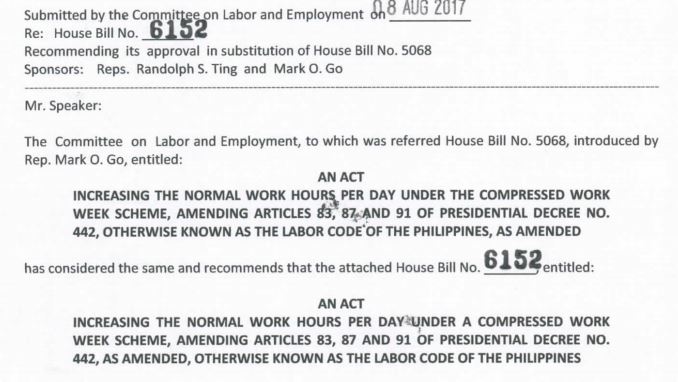The passage of House Bill 6152 (Compressed Workweek Bill) at the House of Representatives is a direct attack on wage and labor standards already set forth in the Labor Code, according to a labor non-governmental organization.
The Ecumenical Institute for Labor Education and Research (EILER) said the Act which increases normal work hours per day under the compressed workweek scheme promotes flexibility only for employers to rake in higher profits with workers working longer hours.
“The proposed amendment in the Labor Code stipulated in House Bill 6152 contradicts laws governing eight-hour day and overtime work. Meanwhile, the workers’ legitimate demands of regularization, living wage and safer working conditions are ignored. The capitalists are then encouraged to exploit workers through low wages and flexible work arrangements,” EILER executive director Rochelle Porras said in a statement on Thursday.
The bill would explicitly allow employers to adopt a scheme where the normal workweek is reduced to less than six (6) days with 48 hours still the normal total work hours per week. EILER noted that workers would need to clock in at least 9.6 hours per day in five (5) days, with the bill essentially giving capitalists a free pass to implement a four-day workweek of up to 12 hours per day relative to “round-the-clock” operations. Millions of workers will continue to face longer shifts and rising overtime hours without overtime pay.
“The proposed compressed workweek scheme only favors the capitalists by saving on labor costs with workers receiving low wages and insufficient to no benefits. This would further promote contractualization, deny workers their security of tenure, and weaken bargaining rights of unions. It completely undermines the victories gained by workers worldwide over the past century against slave-like conditions in the workplace,” Porras said.
EILER also stressed that the latest labor force final results* indicated that almost two-thirds (65.7%) of the 41.7 million total employed persons were working full time, of which 21.8 percent worked more than 48 hours in a week. Moreover, so-called “mandatory overtime” is widely practiced in various enterprises, particularly in Business Processing Outsourcing companies (BPOs).
The labor NGO also stated that the passage of the bill in Congress further exposes that President Duterte, his economic managers and allies maintain the anti-worker policies of previous administrations. The 10-point Socioeconomic Agenda, Philippine Development Plan 2017-2022, and AmBisyon Natin 2040 adopted by the Duterte administration are favorable to foreign investors, would cheapen labor cost in the country at the expense of workers’ wages and job security, and engulf the economy to debt.
“The Congress and Senate should instead prioritize bills focusing on strengthening constitutional rights of workers such as House Bill 1045 or the Regular Employment Bill and Senate Bill 1317 or the Occupational Safety and Health Standards Act. Moreover, we reiterate our call to implement a national minimum wage and junk any department order allowing contractual work arrangements,” Porras concluded.
Download a copy of House Bill 6152 (2017).

